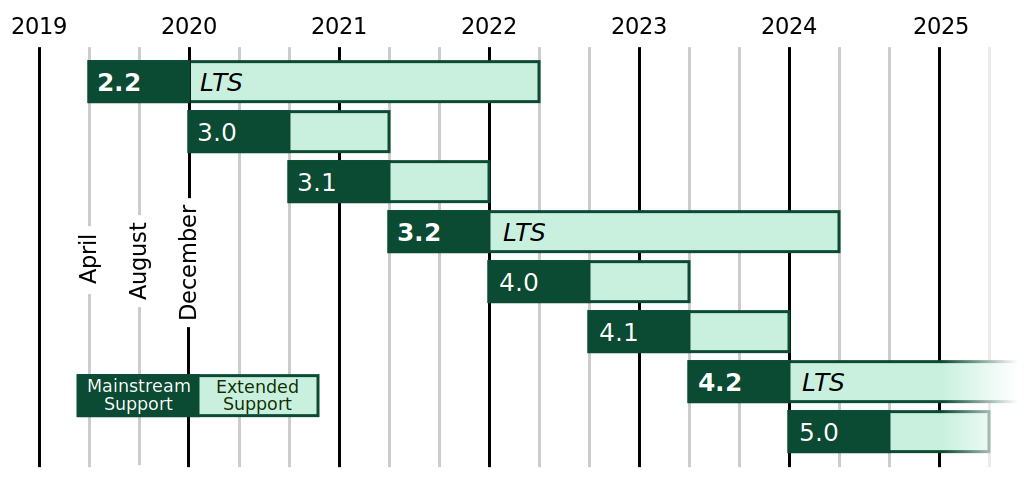Django is a high-level Python Web framework that encourages rapid development and clean, pragmatic design.

| Release | Active Support | Security Support | Latest |
|---|---|---|---|
| 4.1 |
Ends
in 3 months (01 Apr 2023)
|
Ends
in 11 months (01 Dec 2023)
|
4.1.4
(06 Dec 2022)
|
| 4.0 |
Ended
4 months and 4 weeks ago (01 Aug 2022)
|
Ends
in 3 months (01 Apr 2023)
|
4.0.8
(04 Oct 2022)
|
| 3.2 (LTS) |
Ended
1 year ago (01 Dec 2021)
|
Ends
in 1 year and 3 months (01 Apr 2024)
|
3.2.16
(04 Oct 2022)
|
| 3.1 |
Ended
1 year and 8 months ago (05 Apr 2021)
|
Ended
1 year ago (07 Dec 2021)
|
3.1.14 |
| 3.0 |
Ended
2 years and 4 months ago (01 Aug 2020)
|
Ended
1 year and 8 months ago (06 Apr 2021)
|
3.0.14 |
| 2.2 (LTS) |
Ended
3 years ago (01 Dec 2019)
|
Ended
9 months ago (01 Apr 2022)
|
2.2.28 |
| 2.1 |
Ended
3 years and 9 months ago (01 Apr 2019)
|
Ended
3 years ago (02 Dec 2019)
|
2.1.15 |
| 2.0 |
Ended
4 years ago (01 Aug 2018)
|
Ended
3 years and 9 months ago (01 Apr 2019)
|
2.0.13 |
| 1.11 (LTS) |
Ended
5 years ago (02 Dec 2017)
|
Ended
2 years and 9 months ago (01 Apr 2020)
|
1.11.29 |
| Django Release | Supported Python Versions |
|---|---|
| 4.0 | 3.8 ≥ 3.10 |
| 3.2 | 3.6 ≥ 3.10 |
| 2.2 | 3.5 ≥ 3.9 |
| 2.0 | 3.4 ≥ 3.7 |
| 1.11.x | 2.7 , 3.4 ≥ 3.7 |
Not all releases in a series will support all Python versions, the matrix above is for the latest patch release. For more up-to-date info
Feature releases (A.B, A.B+1, etc.) will happen roughly every eight months. These releases will contain new features, improvements to existing features, and such. These can include documented backwards incompatibilities where a deprecation path isn’t possible or not worth the cost.
Patch releases (A.B.C, etc.) will be issued as needed, to fix bugs and/or security issues. These releases will be 100% compatible with the associated feature release, unless this is impossible for security reasons or to prevent data loss. So the answer to “should I upgrade to the latest patch release?” will always be “yes.”
The last feature release for a major version will be designated as long-term support (LTS) release. These releases will get security and data loss fixes applied for a guaranteed period of time, typically three years. Deprecations started in an LTS release (say X.2) will be dropped in a non-dot-zero release (Y.1).
See the supported versions policy for detailed guidelines about what fixes will be backported. .
More information is available on the Django website.
You should be running one of the supported release numbers listed above in the rightmost column.
python -c "import django; print(django.get_version())"
You can submit an improvement to this page
on GitHub
![]() . This page has a corresponding Talk Page.
. This page has a corresponding Talk Page.
A JSON version of this page is available at /api/django.json. See the API Documentation for more.
This page was last updated on 21 December 2022. Latest releases are automatically updated.